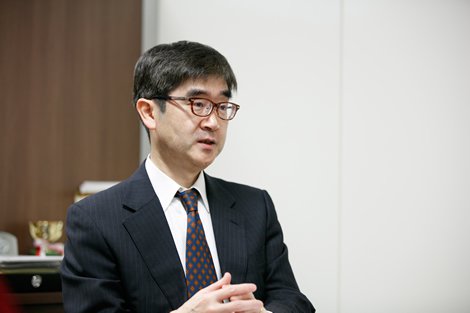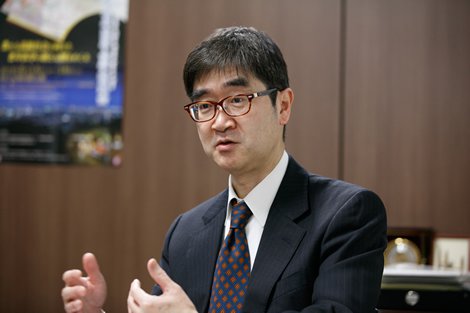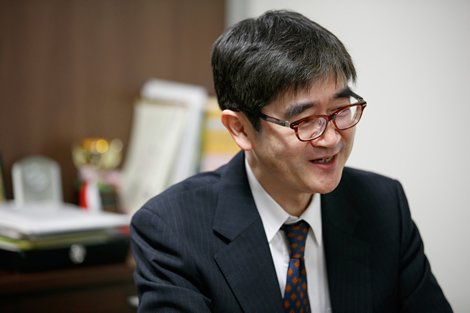Part III Current Status of Dementia and Ethics in Research Involving Patients with It
Introduction

To investigate current trends of research ethics and develop future perspectives on this issue, the Office for Human Research Studies belonging to the Faculty of Medicine, the University of Tokyo, conducts interviews with experts from various fields.
Interview Vol. 3 features Professor Masahiro Akishita of the Graduate School of Medicine, the University of Tokyo (specializing in geriatric medicine and aging; sub-director of the University of Tokyo Hospital and chief of the Division of Geriatric Medicine), who leads research on dementia, to clarify the current status of the disease and determine appropriate ethics in research involving patients with it.
1. Current status and challenges of dementia research

The Alzheimer type may be the most common impression of dementia. In fact, this is the most common type of dementia, accounting for 60% of all dementia cases. With many cases of mild cognitive impairment (MCI), which occurs in the premonitory stages of dementia, leading to it, it is no exaggeration to say that Alzheimer’s disease is the central part of dementia care and research.
At the same time, as there are also various types of dementia due to other causes, such as dementia with Lewy bodies, accurate differentiation is crucial. Particularly in clinical environments, where inappropriate drug administration based on an inaccurate diagnosis may aggravate symptoms, careful approaches are needed.
There is another major challenge: the treatment of dementia is an unmet medical need
(*). This signifies that none of the 4 treatment drugs currently available is curative.
They just delay the progression of the disease.
I would go so far as to say that using these drugs, you can postpone the time to use a care facility a little bit, but you can hardly say: “This medication has been effective” or “The condition has markedly improved”. To tell the truth, some physicians prescribe the drugs, just because they have no other choice.
*Medical needs related to diseases without cures.
There is one more challenge.
In the treatment of Alzheimer’s disease, it is necessary to detect the accumulation of a protein called beta-amyloid, which is responsible for the disease, in the premonitory stages, and provide early intervention. Unfortunately, there have been delays in the development of biomarkers to accurately detect such accumulation. They are already available, but they remain too expensive to be incorporated into general medical services.
On the other hand, with no curative treatment methods available at present, the detection may simply cause confusion in the clinical setting. This is something like being told: “If we do nothing, you will possibly have dementia of the Alzheimer type, but there is no cure”, and answering: “Well, what am I supposed to do now?”.
There are neither curative treatment methods nor drugs showing clear effects available at present. The current situation, however, simultaneously highlights the significance of studying dementia.
With aging, the number of patients with dementia is rapidly and markedly increasing, raising concerns over heavy burdens on our entire society, including increased medical/care costs and early retirement among persons in the prime of life due to the necessity of caring for their parents, resulting in reduced productivity and labor force.
In such a situation, we, researchers, bear grave responsibilities.
The scope of drug discovery (target pathological conditions) is clear.
We search for new drugs to remove beta-amyloid accumulated in the brain or prevent such accumulation by suppressing the synthesis of this protein, but attempts have been unsuccessful so far.
On the other hand, if it does not go well with beta-amyloid, we can try many other proteins, represented by tau. I expect that continuously making attempts with patience, someday we will be able to discover drugs that are at least more effective than those currently available.
2. Covering family care and social activities

Dementia research is also characterized by covering care for the caring families of patients with dementia. The New Orange Plan (*), a national measure for dementia care, also aims to support patients with dementia and their caring families through community liaison.
*Enacted by the Ministry of Health, Labour, and Welfare in January 2015 as a revision of the Orange Plan established in September 2012, with the goal of helping people with dementia maintain their personal lives in their communities they have long lived in as a favorable living environment. The plan is officially called “Japanese dementia strategy (New Orange Plan)”, and it consists of 7 domains.
I have been addressing issues related to “polypharmacy (the concurrent use of multiple drugs)”. In addition to monitoring adverse drug reactions observed in polypharmacy, the families of patients with dementia also bear a heavy burden of managing multiple medications for the patients who cannot take them independently.
At this point, advising these families to adopt various preventive measures against the progression of the disease, such as medications, exercise, and nutritional management, may rather increase their stress. Therefore, the development of drugs and treatment methods that are less burdensome for them is also important in dementia research.
Families’ community lives is another important theme. In order to reduce their burdens and prevent their isolation, it is necessary to support their favorable community lives.
Maintaining the elderly’s community lives will also become a major challenge for Japan’s entire society in the future. In this respect, dementia research may be one of the most advanced scientific areas.
3. Ethical issues in dementia research
The necessity of involving persons other than patients with dementia to make up for the latter’s communication difficulty is also making dementia research difficult. It is ideal to only target the elderly living alone and showing early signs of dementia, but these persons have difficulty even visiting hospitals to receive consultation independently.
Thus, when studying patients with dementia, we need to limit subjects to those with caring families. In such cases, it is important to appropriately explain the study objective to families. As the disease requires attention in various aspects, careful consideration should also be made when requesting cooperation with studies on it.
In the first place, we ask families to visit us several times, and learn about us. Only when we succeed in establishing trust-based relationships with them, creating positive feelings like “This doctor is reliable”, we begin to mention a clinical trial/study, asking them to participate in it. We perform all this process, taking sufficient time.
Nevertheless, desiring to have these families participate in the study, we sometimes feel that we have to make them to do so slightly forcibly. Families feeling forced tend to cancel their participation when they visit the hospital next, saying that they have changed their mind. Once they have decided not to participate, subsequent persuasions are very difficult. The situation will become even worse than withdrawal for both parties if they discontinue visiting the hospital. So, we proceed this process very carefully.
Carefulness remains needed even after successfully obtaining families’ consent and starting the study.
As expected effects cannot be easily achieved in dementia care, patients often express their disappointment, stating: “I take my medications and frequently receive examinations, but my condition does not improve at all”. Some of them even develop distrust.
This tendency is particularly marked among the elderly, who excessively rely on medical services, believing that hospital visits ensure improvements. Once they make a negative evaluation on a doctor, they begin to refuse all clinical trials, feeling themselves like guinea pigs, and close themselves off.
After all, the point is how to establish trust-based relationships with patients and their families.
4. Importance of ethical review for dementia research
Ethical review is important for dementia research, as patients with dementia are socially vulnerable, and it is difficult for them to make appropriate judgments independently, as previously mentioned. If they are forced to cooperate with studies, they may develop distrust. At the same time, they may be easily led to do so if they are asked very persuasively.
Actually, I myself sometimes become anxious, doubting if they have participated with a sufficient understanding of the study significance and objective, or they have consequently been led to do so without agreement.
To prevent these ethical problems in the consent process, the presence of a third person may also be helpful. If you can explain research details in the presence of a guardian or a similar person with a certain degree of knowledge of dementia, and obtain a patient’s consent after such an explanation, you will also feel secure about your study.
There have not yet been similar cases, but hopefully, measures like this will be systematized in the future.

As dementia research also seeks cooperation from caregivers without experience of research participation, applicable study methods are limited. In such a situation, it is burdensome for dementia researchers to fulfill requirements related to the strictness of the study design, such as subjects, intervention, assessment, and measurement methods, and assessment period, in ethical review.
Applicable assessment indices are also limited. In dementia research, patients’ QOL, represented by their improved or stable levels of satisfaction and conditions, is an important index, but such improvements or stability cannot be easily visualized. Not many patients with dementia could appropriately answer questions like “Are you happy?”.
In short, characterized by the difficulty of determining the appropriate assessment method and outcomes, dementia research differs from, for example, studies on iPS cells that are easily designed and evaluated based on the development of new treatment methods and drugs as visible outcomes. It would be helpful if ethics committee members would understand this point.
5. Expectations for corporate participation in dementia research
It is a pity that many companies withdraw from drug discovery projects, in which favorable outcomes are hardly achieved.
For companies, devices may be a less difficult area to address.
For example, there are electric hot pots with sensors. Whenever the solitary elderly use these pots, the sensors transmit signals, confirming that they are alive and safe. Products like these are not medical devices. Therefore, they are more easily ethically approved and put on the market. Network systems to observe wandering patients may also provide good business opportunities for those involved in the telecommunications industry.
It is expected that many companies will actively participate in these business activities that consequently benefit patients and their families.
Conclusion
We recognize dementia as a disease to be addressed by integrating medical, care, and nursing approaches.
Dementia research is often conducted beyond the boundary of each area. However, grants for scientific research from ministries and government offices tend to force vertical approaches. They push researchers, stating: “Please study long-term care payment with our grants”, “Our grants only target studies on medical services”, but this is in discord with actual needs in clinical environments.
Similarly, with regards to ethical review, it would be more constructive if they leave this area to our discretion, rather than enacting too detailed regulations on it.
There are already movements toward the establishment of such a system, but ethics committee members’ deeper insight will also make it easier for us to study, and consequently benefit patients and their families.

